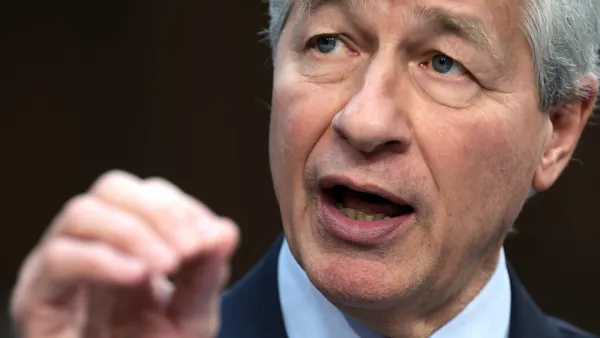Dive Brief:
- The Commodity Futures Trading Commission issued penalties Thursday against Citi, BNY, U.S. Bank, UBS, Santander and SMBC, totaling more than $8.3 million.
- In a throwback to a frequent Biden-era penalty, BNY, Santander and SMBC will each pay $500,000 to resolve allegations that some employees used unapproved communications channels such as messaging apps and mobile text platforms to conduct business.
- The announcement comes as CFTC Acting Chair Caroline Pham, a Republican, begins a stint as the only commissioner at the agency. Kristin Johnson, the CFTC’s last remaining Democratic commissioner, delivered a farewell address Wednesday.
Dive Insight:
UBS will pay the largest penalty among Thursday’s group, at $5 million. The Swiss bank was sanctioned for failing to diligently supervise trade surveillance systems from at least 2015 until 2024, leaving gaps in monitoring foreign exchange, metals, rates, and credit products and exchange-traded derivatives.
Citi, meanwhile, will pay a $1.5 million penalty – reduced for “exemplary self-reporting and … cooperation,” the CFTC said – after the bank failed to file accurate large-trader reports from at least 2015 to 2022 because of “a programming logic error.” Citi also allegedly failed to reliably maintain regulatory records for 10 weeks in 2023.
U.S. Bank, for its part, will pay $325,000 to resolve allegations that it reported inaccurate swap valuation data for certain foreign-exchange products and interest rate swaps from at least 2022 to 2024 because of errors in its valuation methodology.
Thursday’s penalties stem from an “enforcement sprint initiative” Pham pitched in March. In that effort, banks under CFTC scrutiny submitted “reasonable” remediation plans on compliance violations such as recordkeeping or reporting that did not involve fraud, customer harm or market abuse.
“When I announced the [sprint], I expressed concerns about a ballooning enforcement docket for operational or technical noncompliance issues with no harm, with some matters languishing for nearly a decade, diverting resources away from the most critical aspects of [the Division of Enforcement’s] mission to protect against fraud, manipulation and abuse in our markets,” Pham said. “This initiative … positions DOE staff to refocus on fighting fraud and helping victims.”
The off-channel communications penalties come with a markedly lower dollar amount attached than similar allegations did during the last presidential administration. Dozens of banks saw so-called WhatsApp penalties – often in the tens of millions of dollars – levied against them between 2021 and 2024. Banks such as JPMorgan Chase, Wells Fargo, Citi, Goldman Sachs and Morgan Stanley paid $200 million each over the issue – with the CFTC taking $75 million and the Securities and Exchange Commission taking the rest. Bank of America paid even more: $100 million to the CFTC, from $225 million total.
BNY’s penalty Thursday is at least its second related to off-channel communications. The bank paid $40 million to the SEC in August 2024 to resolve similar allegations. As part of its agreement with the CFTC on Thursday, the bank must implement the recommendations of an independent compliance consultant.
Santander, for its part, must conduct an internal audit to assess its electronic communications compliance program with respect to U.S.-based associated persons, and then address any identified concerns, the CFTC said.
In her farewell address Wednesday, Johnson suggested that regulators “measure twice [and] cut once.”
“Deciding the course for financial markets and financial markets regulation simply requires remembering why we regulate and the catastrophic consequences that may follow if we fail to regulate well,” she told the Brookings Institution. “If we fail to rightly prioritize consumer protection or market stability on the road to capturing the benefits of innovation or growth, the results can be devastating.”
Charles Marvine, acting chief of the CFTC’s retail fraud and general enforcement task force, noted Thursday that the sprint “allowed the CFTC to wrap up these six matters efficiently and conserve resources,” but also allow the agency to “prioritize pursuing fraudsters and other wrongdoers going forward.”
The CFTC, since May, has seen wholesale change on its board. Commissioner Christy Goldsmith Romero, a Democrat, left the commission May 31 and retired from federal service. Republican Commissioner Summer Mersinger also left that month to become chief executive of the Blockchain Association. Johnson, around the same time, telegraphed her departure.
Pham, too, said she would leave the commission once President Donald Trump’s nominee to lead the CFTC, Brian Quintenz, is confirmed. Lawmakers have twice postponed votes to advance Quintenz’s nomination out of committee.
The CFTC isn’t the only U.S. financial regulator that’s down to one commissioner. The National Credit Union Administration’s board consists only of Chair Kyle Hauptman after Trump fired Democrats Todd Harper and Tanya Otsuka in April.
Harper and Otsuka sued to be reinstated, but an appeals court paused that action in July.













